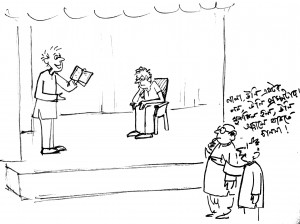That’s the name of my new play when translated to English from Bengali. So what’s the connection between Cassandra and a Chair’s Tale, you may ask! But I’ll have to disappoint you here, because I’d like you – the audience – to figure that out on June 9th and 10th, 2012. What I can tell you, is what motivated me to write this play. Or in other words, why I wrote this play.
I am kind of a person, whom some one may consider to be a pack-rat. I find it hard to throw away stuff. I tend to keep old and apparently useless stuff with the hope that maybe someday they’ll be of some use. Old magazines, gadgets, electronic components, furnitures – I have them all. My storage spaces in and around the house keep filling up with many such paraphernalia that I hardly use anymore. I find it difficult to throw away a perfectly functional chair just because it has gone out of fashion or has some nicks and cuts here and there. But I have also come to realize that I am not alone. There are many people like me who also develop a strong bond with their possessions. To throw away a piece of equipment that has served them for years, is like letting go a dear family member. Continue reading



